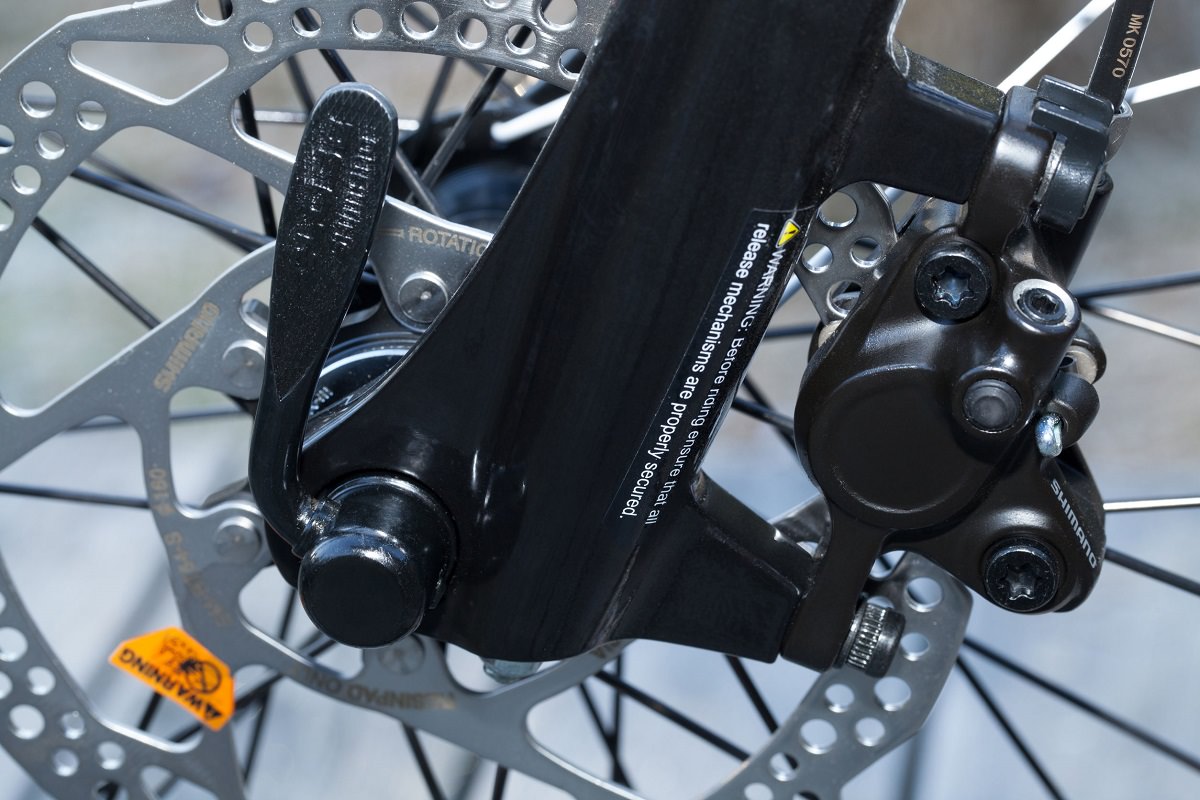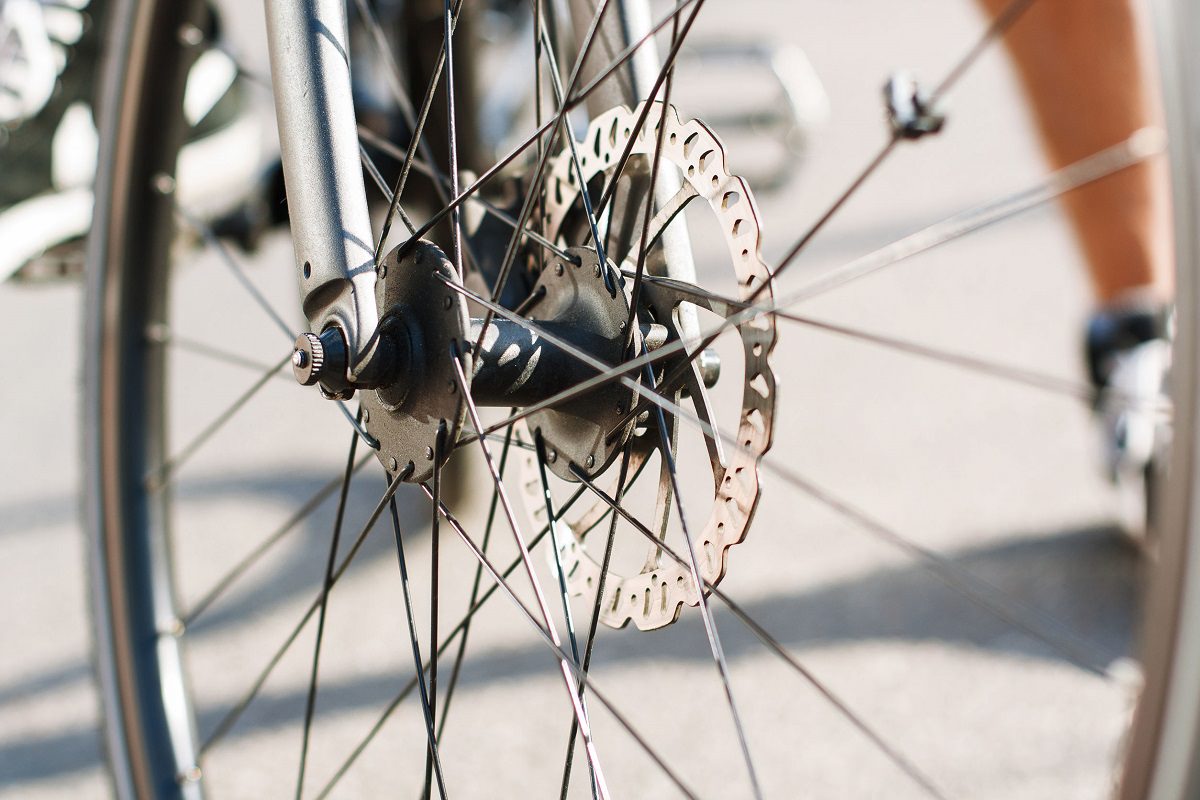You have plenty of options when it comes to the types of brakes you can have on your road bike. There are hydraulic disc brakes, mechanical brakes, rim brakes, and so on. But you might know that on cheaper road bikes, you will have either caliper rim brakes or v-brakes.
I was never fully satisfied riding my road bike with rim brakes. The punch or power in braking always seemed to be missing and I had to be cautious of my speed while applying brakes. That meant that I could never really cycle freely. There was always one thing or another related to braking in my mind.
That was until I switched to disc brakes. Even when I had to upgrade my bike, I really had eyes on the Trek Domane AL 2. One problem: It had rim brakes. So, I switched them with disc brakes and I have never looked back! I even prefer hydraulic disc brakes for mountain bikes but that’s a debate for another day!
Why Disc Brakes Are Better For Road Bikes
However, there are certainly undeniable advantages of a disc brake over the normal, standard-rim brakes. Some of these include:
1. They Are More Effective
The calipers are far more effective than the standard rim brakes. This is because they are larger than the rim pad, which is usually a 3 x 0.5-inch rubber pad on either side of the rim.
The calipers however have a larger surface area than this, allowing them to convert more kinetic energy into heat in a given time without heating up as much. This means that they are far faster in slowing down and bringing a bike to a quick halt. This is a must-feature to have on your bike especially if you are a fast rider.
If you’re looking to upgrade your mountain bike’s braking system, check out our guide on why disc brakes are better for mountain bikes.
2. They Perform On All-Terrains
One of the biggest perks of using a disc brake is that it performs on all types of terrain. Usually, my rim brakes would not work in conditions such as mud and water as effectively as they do on dry roads. A disc brake is not as exposed to water and mud during wet weather.
This means that it can stop the bike with nearly the same efficiency as it would in normal weather conditions. This is great for all you cyclists living in areas with mud or rainy weather as well.
3. Rims Do Not Affect Performance
In a rim brake, a big problem is that the effectiveness of the brake pad depends on the state of the rim. In extreme weather conditions, or due to cycling on roads with a lot of potholes and bumps, rims tend to become warped and disfigured. The brake pads on the rim brakes will then stop generating constant friction against the warped rims.
However, this is not a big concern when it comes to the disc brake. Owing to its independent placement with the wheel, the disc has a far lower chance of being affected by such things as warping.
Are you experiencing issues with your bicycle brakes? Check out our guide on bicycle brake problems and solutions.
4. They Generate Less Heat
Compared to rim brakes, disc brake pads have a larger surface area. This means that when they are in contact with the disc, they generate heat, but not nearly as much as the rim pad does. The reason for this is that the rate of energy generated is proportional to the area over which it is generated.
5. There Is Less Wear And Tear
There is a higher rate of energy transfer and because of this, the disc brake pads tend to wear out at a far slower rate than their rim counterparts. The brake levers and brake caliper are also more durable. This allows for a reduction in replacement costs as well as increasing their safety.
6. Lower Chance Of Flat Tires
One of the biggest disadvantages of rim brakes, especially in hot, sunny climates is the excessive amount of heat generated. This overheating of the rims can cause tires to blow out because the heat can cause the rubber in the tires to weaken. The disc brake is not connected to the rim in any way. It is an extension of the wheel hub.
Because of this, the disc may generate heat, but it doesn’t affect the rim in any way whatsoever. This greatly reduces the chances of overheating and tire blowouts in hot climates or during extreme cycling conditions.
If you’re looking to install front brakes on your bike, check out our guide on how to put front brakes.
7. They Are More Versatility
One of the biggest advantages of the disc brake is the fact that the brake pad doesn’t depend on the size of the rim. You could replace the wheel with a different-sized one depending on the conditions you want to cycle in without having to change the size of the disc brake calipers.
Drawbacks Of Using Rim Brakes On Road Bikes
For a long time, bicycles have used a very traditional type of brakes. These are known as rim brakes, and nearly every road bike and mountain bike has had them. They work using a rubber brake pad that is just over the rim of the front and back wheels. When the brake lever is squeezed, the pad pushes against the side of the rim, generating enough friction to slow the bike down and bring it to a halt.
But there are certain disadvantages of using rim brakes, or at least I have noticed them.
1. Higher Chance Of Failing
Rim brakes have the chance of failing under high levels of stress though. While rim brakes have been tried and tested over and over again in a number of different applications, it can’t be denied that they have the chance to fail.
2. More Wear And Tear
At high speeds, applying the rim brake is likely to cause a lot of friction with the wheel. This will lead to a high level of heat being generated, causing the rubber in the brake pad to wear out faster.
Trust me, you do not want to find out that your brake pad is worn out while freewheeling down a steep gradient!
Are you new to cycling and want to learn more about bike brakes? Check out our guide on how to adjust bike brakes.
3. Restricted Terrain Riding
Another bad thing about the standard rim brake is that it cannot last long under different environmental conditions. For example, while riding through muddy terrain, the rim can collect a lot of slick, wet mud. If you squeeze the rim brakes while the rims are muddy, it could result in slipping and could cause accidents very fast.
Are your bike brakes making a squeaking noise? Check out our guide on why bike brakes squeak.
Rim Brakes Vs Disc Brakes- Why I Prefer The Latter
I have enough experience of riding with both kinds of brakes. Both of them certainly have their own drawbacks but disc brakes undoubtedly outweigh rim brakes when it comes to advantages. Let’s go through a few reasons why I prefer disc brakes to help make you understand my point better.
1. They Have Unmatched Power
Disc brakes have an unmatched power when it comes to braking. They provide consistent stopping power and they are reliable in all kinds of weather. You cannot claim the same about rim brakes.
I have tested them on steep descents, uphill, and with various kinds of obstacles. The result? They provided the same quick response and precise braking every time. This is the reason why I earlier said that I have peace of mind while riding with disc brakes. They are safe.
2. Better Performance On All Kinds Of Braking Surfaces
Disc brakes work better on any braking surface. The biggest drawback of having a rim brake is that their performance is weather-restricted. On the other hand, your disc brakes will work fine on any surface in any kind of weather.
Since the performance of the rim brakes is not affected by the condition of the rim, they are more reliable to work better.
3. Disc Brakes Have A Better Compatibility
Disc brakes have better compatibility with different kinds of bikes. They are compatible with even wider tires and different kinds of rim materials. This can give you some room to select the kind of wheelset you desire. You can customize your bike to your riding preference without any kind of compatibility problem.
4. Future Of Road Biking
The cycling industry today is accepting disc brakes at a very high ratio. The stats make it clear that disc brakes are the future of road biking. Disc brakes not only offer more advantages but they are also safer. This fact is being accepted by different professional racers as well as responsible governing institutes.
If your bike brakes feel loose or unresponsive, check out our guide on how to tighten bike brakes.
Types of Disc Brakes
There are two types of disc brakes:
| Brake Type | Actuation System | Advantages | Disadvantages |
|---|---|---|---|
| Hydraulic | Piston-driven fluid (brake fluid) | – Fine control of pressure application – Common on endurance bikes for precise adjustments |
– Higher cost – More complex maintenance – Adds extra weight to the bike |
| Mechanical | Brake cables | – Familiar and traditional technology – Easier maintenance and part replacement – Cost-effective due to older technology – Preferred for lighter and speedier road bikes |
– Less precise control of pressure application – Generally heavier than hydraulic systems – Limited fine-tuning capabilities – May require more effort to achieve the same braking force as hydraulic systems |
Disc Brakes- How Do They Work?
The solution to this is a fairly innovative new technology for bikes at least. The disc brake has been around for cars for a very long time. How it works is that there is a metal disc connected to the wheel hub. This disc is usually slim and lightweight and has holes drilled in it at intervals. These act as a heat sink for any friction-related heat generated during the braking process.
The disc rotates with the wheel. Calipers are attached to the fork of the bike, and they have brake pads on them. When the brakes are applied, the calipers squeeze the pads against the disc instead of the rim. This causes the kinetic energy of the bike to be converted to heat energy. According to the principle of conservation of energy, the amount of kinetic energy lost is equal to the heat energy generated.
This means that if all the kinetic energy the bike possesses is converted to heat, the bike will come to a complete standstill. It is just basic physics. Now, it may seem to you that the disc brake’s operation is the same as the rim brakes. This is true. They operate on the same principle. Friction has always been the best way to stop a moving object.
FAQs
Are disc brakes better in rain?
Yes, as compared to other brakes, disc brakes work better in rain.
Can I clean disc brakes with water?
Yes, you can clean disc brakes with water.
Can I change my rim brakes to disc brakes?
Yes, you can change your rim brakes to disc brakes but it is a very costly procedure.
What brakes do Tour de France use?
Most riders in the Tour De France were using disc brakes.
Does oil ruin brake pads?
Yes, oil does ruin brake pads.
What is the best oil for disc brakes?
Mineral oil is considered the best oil for disc brakes.
Recap
After an extensive comparison of both kinds of brakes, I stand firm on my point that disc brakes for road bikes are a much better option than rim brakes. They are weather-reliable, versatile, have a better heat disparity, and are even future-proof.
So, if you are looking for better performance along with the best safety, my suggestion would be to choose disc brakes for your road bike. How do you feel about disc brakes? Are they a better option? Let me know in the comments below!
Also Read
- How To Install Caliper Brakes On Bike In 9 Easy Steps!
- How To Tighten And Align Brakes On Bike – Bike Tips And Tricks
- Cantilever Brakes Vs V Brakes: Which One Is Better For Your Bike
Should you have any questions or require further clarification on the topic, please feel free to connect with our expert author Luke Ameen by leaving a comment below. We value your engagement and are here to assist you.





5 thoughts on “7 Reasons Why Disc Brakes For Road Bikes Are A Better Option”
This is so helpful and interesting
I am a conventional ‘bloke on a bike’ who uses it mainly for getting from A to B (and, hopefully, back again!) A few months ago I purchased a shiny new ‘road/off road’ bike with cable-operated disc brakes, believing these brakes to be a huge improvent on my previous rim jobs. Wrong! For stopping power these discs aren’t a patch on my old brakes, which stopped me almost instantly on a moderate hill, whereas these things take forever to bring me to a halt no matter how hard I squeeze the lever. There’s just no comparison. Am I alone in this?????
Disc brakes also put a bending moment in the spokes when braking because of the tire reaction force at the ground, therefore you need to have more/heavier spokes = heavier wheel.
This post is really one sided. Been club riding since 1982 and never had any problem with rim brakes even on Vermont downhills nor have any people I ride with. Bike manufacturers have to make bikes obsolete so they keep fiddling with the product. Bikes are really expensive and if they are the same or look the same few people will upgrade. I love my Dura Ace rim brakes.
Attempts to compare drum/disc brakes on a car to rim/disc brakes on a bicycle just shoot your credibility. I am so disillusioned when I see such a comparison. I really have to wonder if the author knows anything about the subject matter. If they do, then they aren’t being honest. They’re just trying to get quick points by making an invalid comparison.
Each system has advantages and disadvantages. I find rim brakes to be cheaper, less complex, easier to maintain, and sufficient to stop the bike. Unless I purchase a new bike, there is no sense worrying about disc brakes. The cost to convert is just not worth it, even if I accepted the trade offs of disc vs rims.
It should also be mentioned that in stopping the bicycle, not only do I need to stop the wheels from spinning (which both systems can do well), but I need to do so while keeping my tires gripping the road. It does me no good to just lock the wheels. Perhaps hydraulic disc brakes might have an advantage here, but I know the rim brakes can do the job well too.